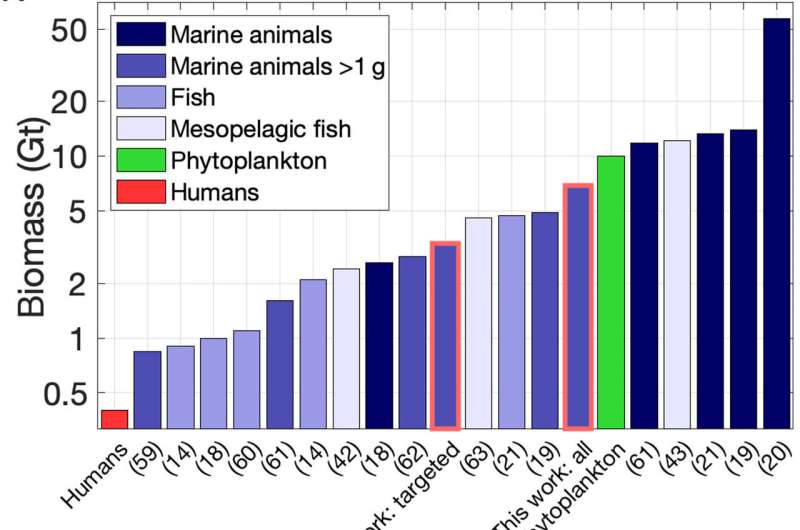October 11, 2021 report
Model suggests fish fecal carbon sequestering in the ocean has declined by half over the past century

An international team of researchers has created a model that estimates the effects on the world's oceans over the past century by fish and their excrement. In their paper published in the journal Science Advances, the group describes the factors they put into their model and what it showed.
Around approximately 1900, humans began commercializing fishing—an event that signified a massive increase in the numbers of fish that were caught every year. That increase has led to decreased numbers of fish in the world's oceans. In this new effort, the researchers wondered what impact this decrease has had on the amount of carbon sequestered by the ocean.
The researchers began by noting that fish push out a near constant stream of excrement, and that excrement holds some amount of carbon, which comes from the phytoplankton that the fish eat. Excrement falls in the form of heavy pellets, most of which make it to the ocean floor. Once there, it builds up, layer after layer—a form of carbon sequestration. The excrement also holds some amount of oxygen, which is consumed by organisms on the seafloor. To determine the degree of change in deposited fish excrement, the researchers studied historical documents to develop an estimate of how many fish have been taken from the sea, and how many live there now compared to a century ago. They used that data to make other estimates, such as the amount of phytoplankton fish ate before commercialized fishing began and how it has changed since then. They estimated, for example, that fish consumed approximately 2% of the total amount of organic material consumed globally a century ago. They also estimated that the entire biomass of fish globally has dropped by approximately 47% over the past century. The researchers used these numbers in their model and made estimates about other changes to the ocean that have occurred due to drops in fish populations. They also factored in ecological theory and prior work done to estimate phytoplankton growth and energy transfer.
Their model showed that the amount of fecal matter dropped by fish globally is approximately half of what it once was, which suggests only half as much carbon is being sequestered. The remainder is likely entering the atmosphere, contributing to climate change.
More information: Daniele Bianchi, Estimating global biomass and biogeochemical cycling of marine fish with and without fishing, Science Advances (2021). DOI: 10.1126/sciadv.abd7554. www.science.org/doi/10.1126/sciadv.abd7554
Journal information: Science Advances
© 2021 Science X Network





















